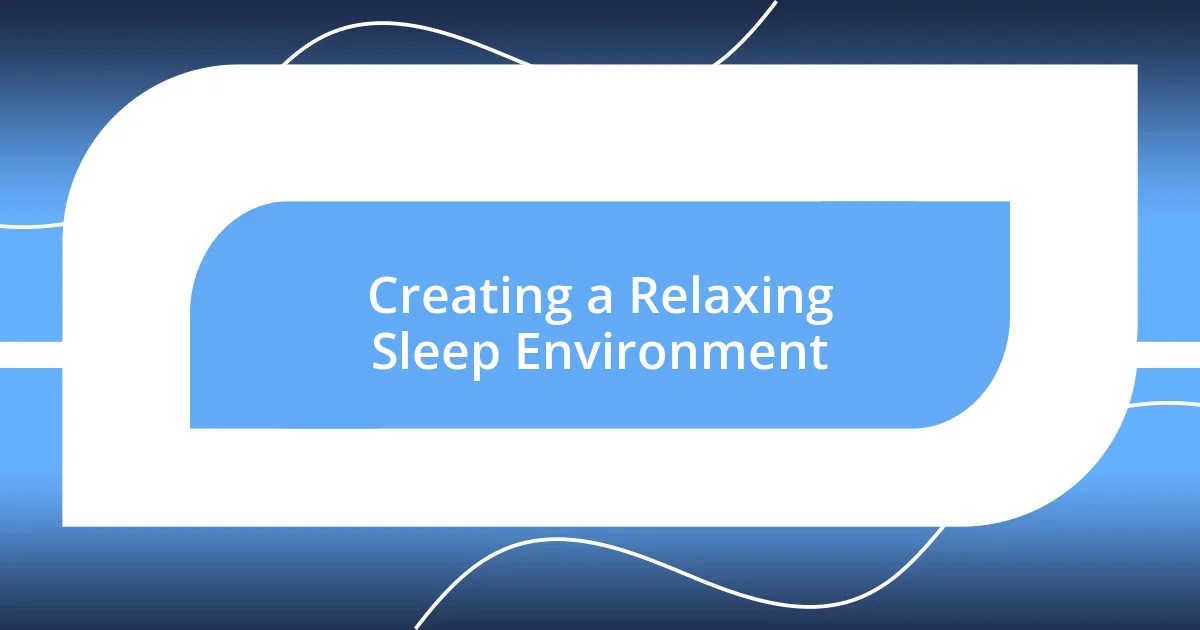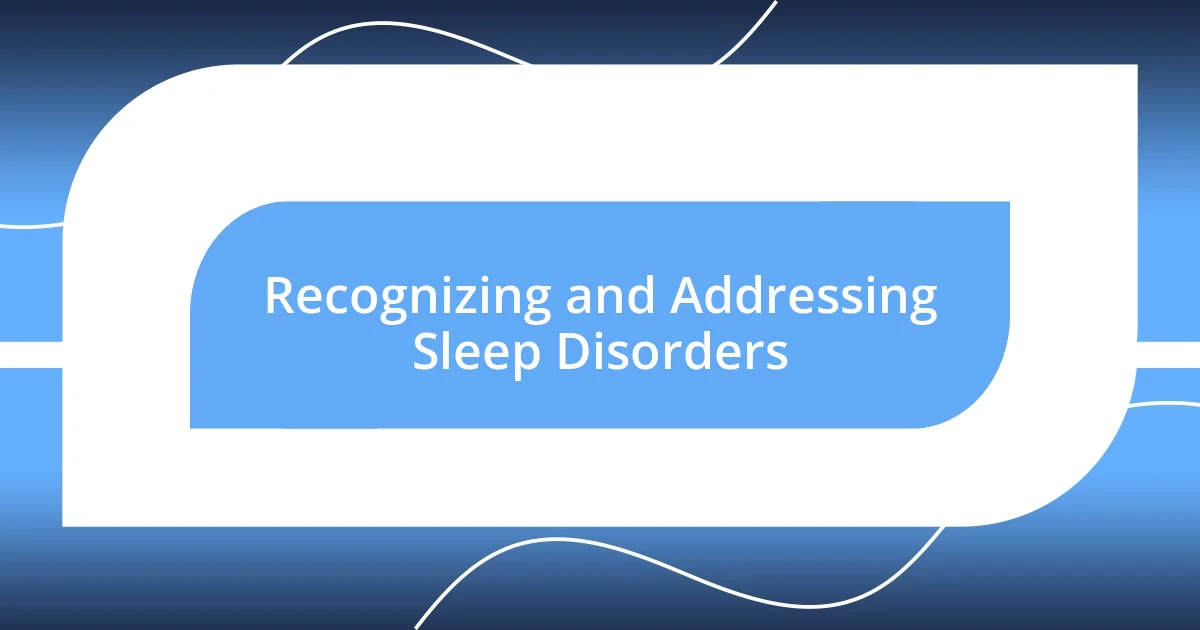Key takeaways:
- Establishing a consistent sleep schedule significantly enhances energy levels, mood stability, and overall sleep quality.
- Creating a relaxing sleep environment through factors like lighting, temperature, and bedding can greatly impact sleep quality.
- Recognizing and addressing sleep disorders is essential for improving sleep; keeping a sleep diary can help identify patterns and symptoms.

Understanding Sleep Hygiene Basics
Sleep hygiene refers to the habits and practices that promote quality sleep. I remember a time when I would scroll through my phone right before bed, thinking it wouldn’t affect my sleep. But when I finally decided to switch off the screens well before bedtime, I noticed a remarkable difference in how I felt each morning. Have you ever considered how your evening activities might be sabotaging your rest?
Creating a dedicated sleep environment is another crucial aspect of sleep hygiene. For me, dimming the lights and keeping my bedroom cool transforms the space into a restful retreat. I often find it fascinating how simple changes can lead us to feel more relaxed. Is your bedroom a sanctuary or a collection of distractions?
Consistency plays a vital role in regulating our sleep cycles. I’ve learned that going to bed and waking up at the same time—even on weekends—helps my body know when it’s time to rest and to wake. Can you imagine the serenity of waking up refreshed, knowing your body is well-tuned to your routine? Prioritizing this aspect has truly been a game changer for my own sleep experience.

Importance of a Sleep Schedule
Understanding the importance of a sleep schedule is like unlocking a door to better well-being. When I started going to bed and waking up at the same time every day, I was amazed at how much more energized I felt. It’s almost as if my body quietly celebrated this consistency, and I found myself waking up without that dreadful grogginess. Have you noticed how a regular routine can put you in a better mood?
Moreover, sticking to a sleep schedule can positively impact our mental health. I remember those days when my sleep was erratic. My mood swings were like a rollercoaster; one day I’d be elated, and the next, I could hardly get out of bed. It became clear to me that maintaining a routine didn’t just support physical health but also smoothed out the peaks and valleys of my emotional state. How has your sleep schedule affected your mood over time?
Finally, a structured sleep routine aids in improving overall sleep quality. For instance, I started noticing how my body responded to a predictable bedtime when I transitioned to a new job with early hours. I felt more focused and productive during the day as my sleep became more restorative. The clarity I gained from simply regulating my sleep times was invaluable. If you’re looking for that extra edge in your day-to-day life, why not give a consistent sleep schedule a try?
| Sleep Schedule Benefits | Your Experiences |
|---|---|
| Improved Energy Levels | Feeling more refreshed after waking up consistently at the same time |
| Better Mood Stability | Experiencing fewer emotional ups and downs |
| Enhanced Focus and Productivity | Noticing clarity and effectiveness in daily tasks when sleep is regulated |

Creating a Relaxing Sleep Environment
When I think about creating a relaxing sleep environment, I realize how much of an impact even the smallest details can have on our rest. One night, I decided to try a white noise machine. To my astonishment, it drowned out the sounds of the city and wrapped me in a cozy cocoon of calm. It’s those seemingly simple changes that often make the most significant difference. What personal touches have you added to your sleeping space?
To truly enhance your sleep environment, consider these elements:
- Lighting: Use soft, warm lights to signal to your brain that it’s time to wind down.
- Temperature: Keep the room cool—around 60-67°F (15-19°C) works well for many.
- Bedding: Invest in comfortable mattresses and pillows that support your preferred sleeping position.
- Declutter: A tidy space can reduce anxiety; aim for minimal distractions around you.
- Aromatherapy: Experiment with calming scents like lavender, which some studies suggest can promote relaxation.
Each of these elements reflects my personal journey toward better sleep. For instance, I’ve found that my choice of bedding significantly affects how restful my night is. Every time I pull back the covers and feel that luxurious fabric, it’s like a little reminder that I’m prioritizing self-care. How does your environment play a role in your overall sleep quality?

Tips for Daytime Activities
Engaging in physical activity during the day has been a game-changer for my sleep. I remember when I used to spend hours on the sofa, thinking I could just wind down. Yet, it wasn’t until I started going for brisk walks in the mornings that I noticed a distinct change in my sleep quality. The fresh air and movement lent me a sense of clarity that translated into a better night’s rest. Have you tried incorporating even a small burst of activity into your routine?
Balancing daytime activities with relaxation is crucial. On days when I schedule too many commitments, I find my energy dipping in the evening, leading to restless nights. Instead, I’ve learned to carve out quick breaks to stretch or engage in simple mindfulness exercises. These moments not only prevent fatigue but also help recharge my mental state. How do you manage your energy levels throughout the day?
Social interactions can also influence our sleep hygiene. I cherish evenings spent catching up with friends, whether in person or via a quick chat on the phone. Those connections provide a release, similar to what I experience after a satisfying workout. They help me unwind and detach from the day’s stresses. Have you noticed how meaningful conversations can set the tone for a restful night?

Establishing a Nighttime Routine
To establish a nighttime routine, I’ve found that consistency is key. Every evening, I set aside 30 minutes to unwind before bed. I often start with a warm bath, letting the water soothe my muscles and wash away the stresses of the day. Have you ever noticed how that simple act can help signal to your body that it’s time to slow down?
Once in my cozy pajamas, I add the next layer to my routine—reading. I love curling up with a good book, as it transports me to another world, away from screens. It truly creates a gentle barrier between the day’s hustle and the tranquility I seek for sleep. What book would you find hard to put down before bed?
I also practice a short mindfulness meditation that helps clear my mind. As I sit quietly, focusing on my breath, I release the worries that might otherwise keep me awake. In this space, I often reflect on what I’m grateful for, which sets a positive tone for my night. Have you ever tried connecting with your thoughts in such a deliberate way before drifting off?

Managing Technology Use Before Bed
Managing technology in the evening can be a real challenge. Personally, I noticed how scrolling through my phone endlessly before bed only left me feeling restless, as my mind buzzed with information. It wasn’t until I set a firm “no screens” rule an hour before bedtime that I truly began to notice a shift in my sleep quality. Have you considered what impact your devices might have on your nightly rest?
I recall one particular night when I decided to leave my phone in another room. The absence of notifications created a peaceful void, allowing my thoughts to settle more easily. I found that reading a physical book instead opened up a world of imagination, calming my mind and creating the right ambiance for sleep. It’s fascinating how a simple habit change can transform your whole evening atmosphere, isn’t it?
Implementing a technology curfew has been a significant game-changer for me. After embracing this practice, my evenings now stretch out with opportunities for connection or reflection instead of being consumed by digital distractions. I often turn to journaling or spend quality time with family at this hour, which fosters deeper bonds and enriches my sleep experience. Have you thought about how redistributing that time could enhance your own nighttime routine?

Recognizing and Addressing Sleep Disorders
Recognizing sleep disorders is crucial for anyone struggling with poor sleep quality. When I first began to dig deeper into my sleep struggles, I noticed patterns that didn’t sit right. Episodes of waking up gasping for air or the crippling inability to fall asleep were red flags signaling that something more serious might be at play. Have you ever experienced obvious signs, yet brushed them off as just “stress”?
Sometimes, the most common sleep disorders, like sleep apnea or insomnia, can be masked by our daily routines. I remember dismissing my snoring or late-night restlessness as mere annoyances, only to discover, through consultation with a sleep specialist, that I was facing a sleep disorder. Understanding these symptoms not only opened my eyes but also drove me to seek help. It really makes you wonder: how often do we overlook these signals in our own lives?
Addressing sleep disorders often starts with a proper diagnosis. For me, keeping a sleep diary was enlightening; it revealed patterns that I hadn’t previously recognized. Tracking how many hours I slept, my sleep quality, and any disturbances helped me articulate my experience clearly to my doctor. Have you ever considered such a personal log to better understand your sleep habits? It could be the first step towards waking up refreshed and ready to embrace the day.












